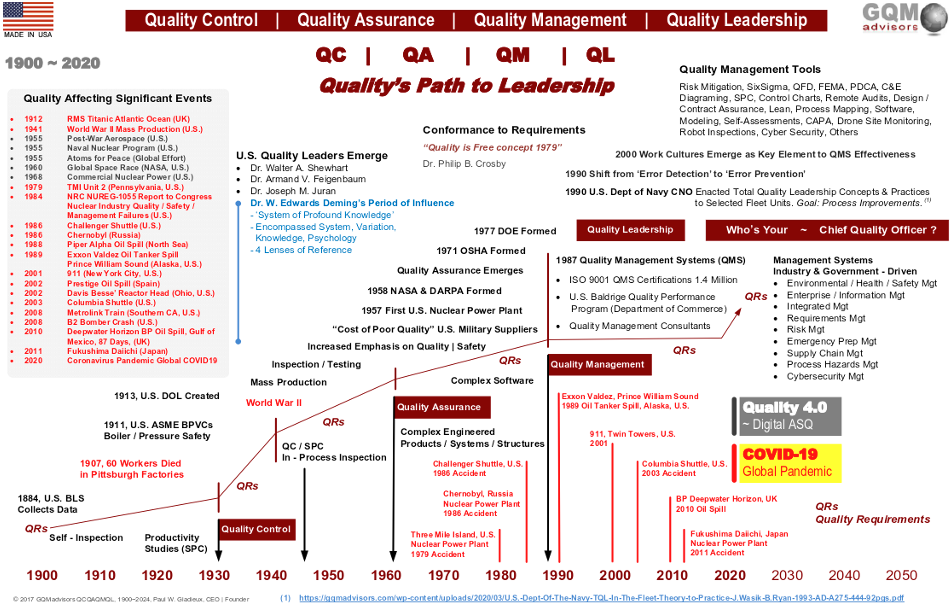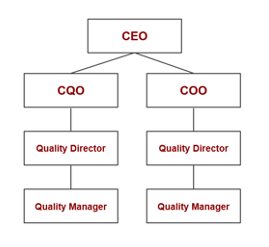 CERM members and professionals in virtually all management disciplines will surely recognize the positive impact a groundbreaking White Paper entitled ‘Your C-Suite & CQO,’ August 2024, will have throughout many business sectors and segments world-wide. Greg Hutchins knows the authors through his Advisor activities with them in the GQM Advisors Group.
CERM members and professionals in virtually all management disciplines will surely recognize the positive impact a groundbreaking White Paper entitled ‘Your C-Suite & CQO,’ August 2024, will have throughout many business sectors and segments world-wide. Greg Hutchins knows the authors through his Advisor activities with them in the GQM Advisors Group.
The co-authors pose one fundamental question that spurs other thought-provoking questions when asking ‘Is There One Common Sense Reason to Keep a CQO Out of Your C-Suite’? In their collaborative discussions, research, and the complete paper, Paul W. Gladieux, CEO | CQO | Founder & Scott B. Kaley, Captain (Ret.) | Executive Advisor, provide a sound basis for C-Suites everywhere to consider leveraging from appointing a Chief Quality Officer (CQO). After months of discussing their professional roles and responsibilities in ‘high consequence’ business sectors, they were compelled to address the CQO subject.
The paper is backed by their collective 90 years of knowledge performing in two high consequence heavily regulated business sectors regarding ‘The Management of Quality.’ Their insights are from extensive experience engaged in Nuclear Energy Production and Commercial Aviation, that with no doubts, operate in high-risk high-value services. The result of exploring the subject generated numerous questions regarding the critical role of a CQO. Mr. Gladieux and Captain Kaley essentially challenge C-Suites everywhere to appoint a CQO.
What remains fascinating about the word quality and its use, is everyone has their own interpretation of what quality is. Companies world-wide expect their employees to adopt and use their version of quality in practice. One challenging aspect is perception. After numerous books, thousands of articles, many certification programs, and many online training courses, wouldn’t you think it’s finally accepted as a critical management discipline with routine understandings, one definition, and in C-Suite’s via a CQO?
 The Chief Quality Officer ~ Why Not?
The Chief Quality Officer ~ Why Not?
Currently, why isn’t The Management of Quality represented in the modern C-Suite among the other chief officers? C-Suites originally included 5-7 members such as the CEO, COO, CFO, CAO, CIO, CMO, and CTO. We have seen new appointments in recent years that make sense such as Chief Programs Officer, Chief Data Officer, and Chief Nuclear Officer.
Of course, there’s always people that push ideas and agendas beyond any level of common sense. Some ideas truly represent personal agendas of no true value to a business group or other entity. As we researched the Chief Officer topic, we came across an online article by Rob Kelly (his blog ‘Job Titles’), posted on ONGIG, February 4, 20201 https://blog.ongig.com/job-titles/c-level-titles/ Mr. Kelly’s article is very comprehensive and includes three groups of a total of more than 27 chief titles.
We’ve Googled ‘Chief Quality Officer’ several times over the years. Typically, the role is defined as something like this “The Chief Quality Officer is responsible for planning, administration, and monitoring of consistent readiness of all quality management, regulatory requirements, and quality improvement processes.” In our opinion, this definition works in general terms. Without an accurate, meaningful, and fully endorsed definition of quality metrics by C-Suite executives, a solid system of quality management, effective quality assurance and quality control programs, a strong quality and safety culture, absolutely affects profitability.
Quality ~ Defined Performance Requirements vs. Perception
The workforce knows their job is to perform to the standards set by their leaders. One of the roles of the quality professional is to assist the organization with defining performance metrics and determining the proper methods for measuring and verifying conformance to requirements in customer contracts and engineering specifications. Quality engineers typically focus on assisting the workforce for engineered products and services.
Seasoned quality management professionals know their job is to advise and assist C-Suite executives and senior management in deploying quality-related policies, process descriptions, and procedures that are customer contract-based. The deployment goal is an effective management system within legal frameworks and proven quality system structures based on international norms, regulatory requirements, customer contracts, and corporate objectives. They know each person is responsible for the quality of their work activities and tasks related to stated deliverables.
Why Appoint a ‘CQO’?
Why would a knowledgeable and seasoned quality management professional work in a company that does not have direct representation in the C-Suite for the entire workforce? Are not the CFO and COO working together to accurately address Cost and Schedule relative to program, quarterly, and annual performance goals? Who’s addressing and directing the C-Suites’ Vision, Mission, and Policy on ‘The Management of Quality’ for all operational and program goals and the employees?
Who is the CFO working with to ensure budget allocations are correct and expenditures are effectively reported? Does the CFO understand the true basis of cost impacts when nonconforming conditions arise? Does the C-Suite routinely evaluate quality performance metrics in terms of supply chain performance, cost of poor quality and schedule delays due to rejects/repairs/reworks, customer satisfaction results, and workforce attitudes? Who reports quality metrics to C-Suite members and ensures process improvements will be made as applicable?
Wouldn’t you think that at least all publicly owned (traded) companies would be required under SEC rules to appoint a CQO just as SOX compliance (2002) is the rationale and minimum basis for a CFO? We know shareholders want risk prevention methods and customer satisfaction. Why wouldn’t everyone in the C-Suite want to know their operational ‘Cost of Poor Quality’? Wouldn’t your C-Suite want to know areas of employee concern and the root cause of non-conforming conditions?
Collectively, with more than 90 years of experience in the quality profession, why would we keep asking these same questions regarding the three well known key elements of management and success ~ Cost, Schedule, and Quality? Is it because the three elements are typically expressed in this order of importance? We’ve both experienced deficient planning, weak performance, sub-standard execution, inadequate resources to accomplish goals and objectives, and little to no follow through. In your organization, which depicts the ‘Order of Importance’?
Is it because we all know an ‘Effective Quality Culture’ is the key to success but it’s a complex discipline with extreme difficulty in gaining consensus? Or is it difficult to achieve due to perception differences? Wouldn’t an effective quality culture emerge and be ingrained in an organization if the CEO and all the chief officers truly understood and endorsed the management of quality as a part of routine business? Do you wonder how many chief officers worked in a quality professional position during their career path on the way to the C-Suite? We envision executives using the quality word often!
The paper is intended to keep the Why, Who, Where, When of The CQO subject alive until common sense takes over among the sectors and segments that need to have Quality representation in the C-Suite as a matter of routine – not corrective actions due to a catastrophic failure and public apology tour. We mean pure business in our efforts to sound the alarm and bring the general consciousness of Quality Awareness to everyone. Conforming to Requirements is a simple concept and something everyone should understand whether at work, home, school, church, travelling, medical care, and the communities and neighborhoods around the world. What most would call ‘Quality of Life.’
 Without a CQO, which C-Suite Executive ‘Automatically Wears the Quality Leadership Hat’?
Without a CQO, which C-Suite Executive ‘Automatically Wears the Quality Leadership Hat’?
Does that person address quality policy often during daily operations and through internal / external correspondence? Does your workforce know this person is serious about the management of quality and fully understands all aspects required in the leadership role? Is the designee executive position stated in the governing policies and by-laws of the C-Suite? When applicable, does the Board of Directors know who is ultimately responsible for addressing, correcting, and improving quality-related issues?
 The CQO Body of Knowledge ~ Roles | Responsibilities | Reporting
The CQO Body of Knowledge ~ Roles | Responsibilities | Reporting
The CQO basis for qualification at this point is seemingly overwhelming and impossible to define. Who is qualified to know all aspects of quality throughout an entire corporation? Who knows all the requirements and how they are met? Isn’t ethics and truth the key to total compliance? Is it possible the CQO position requires a person with inherent generalist ‘big picture’ skills and the ability to ‘reduce their focus’ to individual parts? Wouldn’t it be best for the person in the CQO role to demonstrate rudimentary beliefs in Quality and The Law with clear understandings of managing risk? We know how fortunate a company would be for the CQO to have hands-on-experience working in the quality profession in QC, QA, and QM before an appointment in the C-Suite as the CQO.
Quality reporting structures vary across the various business sectors world-wide. In highly regulated safety-related sectors and segments, requirements documents state specific reporting roles and structures. These are where ‘free from production pressure’ requirements apply. What isn’t consistent is the requirement of reporting quality-related performance and issues to the CEO. Have you ever talked with a new hire that says ‘our Quality Director isn’t allowed
to talk with the CEO’? Have you ever heard someone say ‘our CQO is the only person allowed to send messages or talk directly with our CEO? Let’s consider some basic questions organization structure and reporting.
- Does your CQO report directly to the CEO ~ Why Not?
- Does your Quality Director or Manager report directly to the COO ~ Why?
- Which reporting path is how quality is reported to your CEO?
- Which reporting path, in your opinion, is the most effective?
- In your company, can anyone generate a stop work action?
 The CQO
The CQO
C-Suite Executives and Boardroom Directors, if you want a feel for where Quality stands in your organization, ask your employees to submit their definition of Quality and the company overall quality performance metric using a 1 to 10 measurement. As internet users, we’re asked for performance feedback from retailers, medical providers, and grocery stores. If you want to know your workforce status on the need for a CQO, we suggest you ask a simple yes or no.
- Does your C-Suite include a CQO?
- Are all employees encouraged to directly contact your CQO?
- Is there one common sense reason to keep a CQO out of your C-Suite?
The Federal Department of Quality (DOQ) ~ U.S. Secretary of Quality
Please think about it. Doesn’t it make common sense to have a Federal Department of Quality headed by a Secretary of Quality after considering what we’ve shared in this paper? We have the DOJ, FBI, DOE, EPA, FAA, OSHA, DOC, NRC, DHS, and others. Why not the U.S. DOQ? A starting point is a commitment by the executive branch and congress to enact the U.S. Malcolm Baldrige Performance Excellence Program throughout all U.S. federal governmental organizations. Considering the global adoption and implementation of the International Organization of Standards for quality, safety, environmental, aviation, medical, cybersecurity, and other management system disciplines; we believe certain requirements in these documents should also be committed to by applicable government entities.
Co-authors
Paul W. Gladieux, CEO | CQO | Founder, paul@gqmadvisors.com https://gqmadvisors.com/professional-resources/advisors/#teamMember8
Paul W. Gladieux, LinkedIn, (8) “paul w. gladieux” | Search | LinkedIn
Scott B. Kaley, Captain (Ret.) | Executive Advisor, Sbkaley@gmail.com https://gqmadvisors.com/professional-resources/advisors/#teamMember17
GQM Advisors, https://gqmadvisors.com/contact/
The following are excerpts from the complete white paper that’s available in full by contacting Mr. Gladieux at paul@gqmadvisors.com and the GQM Advisors website Articles Page https://gqmadvisors.com/insights/articles/
The paper is also posted on LinkedIn at (8) “paul w. gladieux” | Search | LinkedIn Captain Scott B. Kaley may be contacted at Sbkaley@gmail.com https://gqmadvisors.com/professional-resources/advisors/#teamMember17